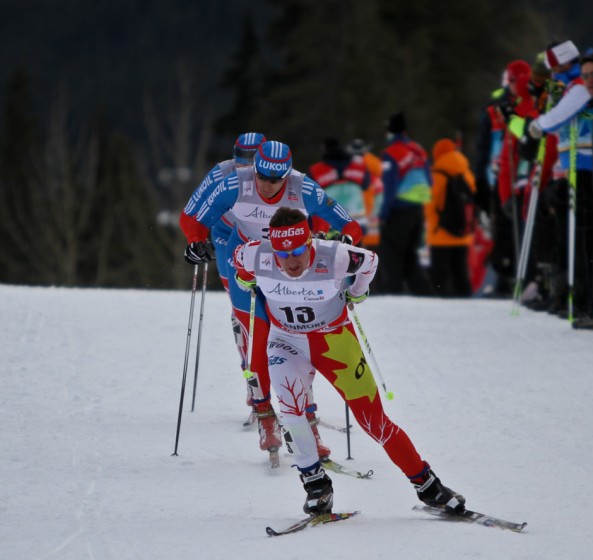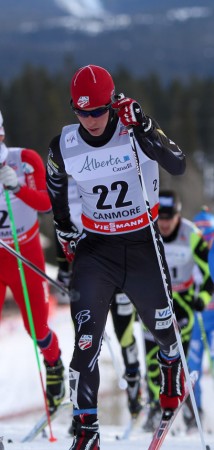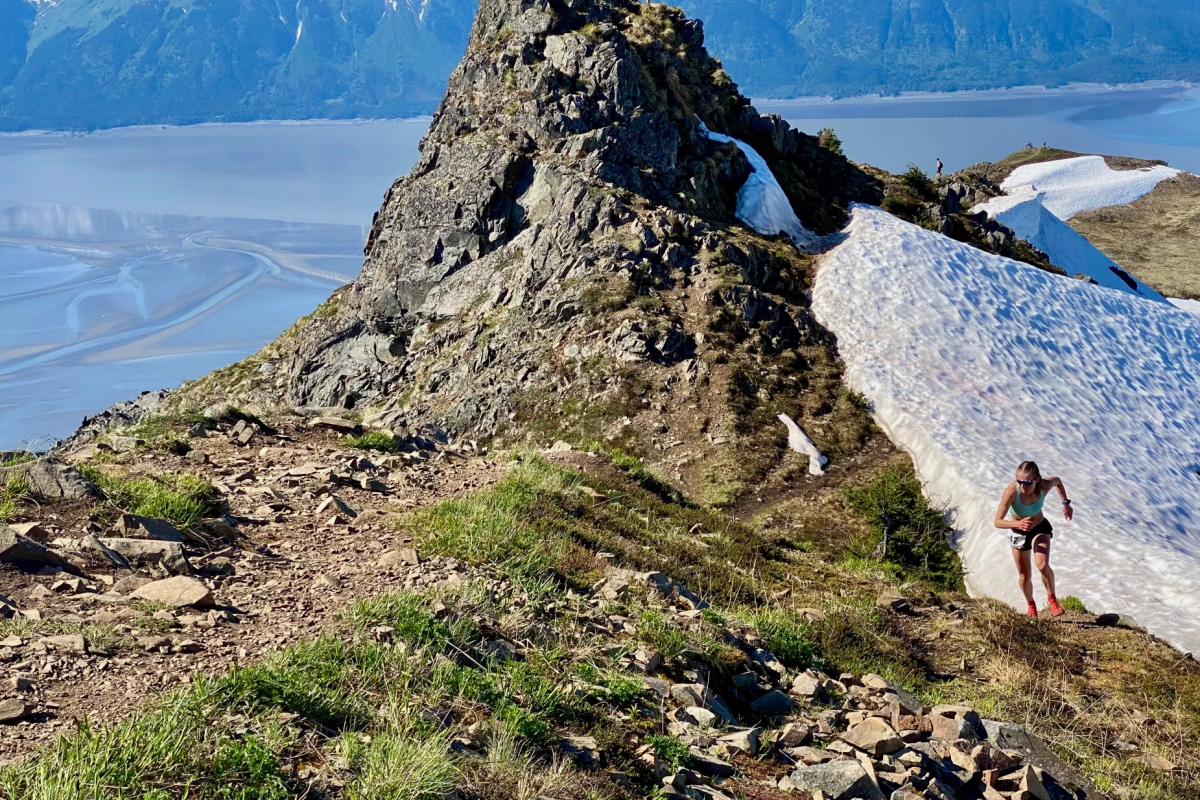
At a venue of Olympic proportions the men’s World Cup field took to the course in Sochi, Russia, on Saturday to sort out who could outlast everyone else over 30 k. It turned into a unique mass start event; freshly falling snow meant that a gigantic pack stayed together for longer than it would have otherwise, and a slight mishap could result in five or more skiers blasting by in the blink of an eye. Such moments were defining, as it was nearly impossible to pass anyone back after mistakes.
More than one competitor had experience with this phenomenon on Saturday. Ivan Babikov (CAN), who placed 17th, was derailed by oncoming traffic as he left his box in the exchange zone, and was forced to play catch-up for the rest of his race.
“You could try to go around people and you just got buried in the snow,” Babikov said. “You just wasted so much energy to go around one person.”
He knew by the time another athlete glided over his skis halfway through. Babikov tried to leave his exchange zone box cleanly after a decent classic portion that brought him into the exchange right with the main pack. But when the other skier almost ran into him, Babikov’s pole got tangled with his own boards, and in the ensuing chaos and he lost critical seconds and places.
“I lost lots of positions, so that didn’t help. I had to chase back and try to go around people and it was hard,” Babikov said.
The effort spent moving around people through deep snow sapped him of the energy to fight in the finish.
“There was a point at the bottom of the last hill where I was 11th or something, but like I said I just had one gear today and couldn’t go any faster,” Babikov said. “Seventeenth is not bad for any World Cup, but today the course was kind of my type and my body wasn’t 100%.”
The Russian native was racing the Sochi courses for the first time, just like everyone else, and noted that he was still mainly happy with a race whose primary purpose was to preview the 2014 Olympic venue.
“My legs weren’t in good shape and I couldn’t have my speed, but I’m still pretty satisfied,” Babikov said. “We were just testing it out so now we know what it’s like for next year.”
Most of the field will likely agree with him when he says he hopes it will be clear and sunny in 2014.
“I’m pretty positive for next year and hopefully the conditions, if the tracks are harder and the sun would come it would be a different story,” Babikov said. “It was cool to see all the volunteers really fired up, so it was a good experience, anyway.”
Devon Kershaw was the only other Canadian in the skiathlon on Saturday. He led the entire train at one point and sat in tenth in the pack at 10 k, but began to have problems in the skate segment and dropped to 38th by the finish, 1:37.3 off Cologna and 1:03.3 behind Babikov. Kershaw did not respond to inquiries on Saturday afternoon.
Hoffman 26th and Back in the Points
Noah Hoffman, the lone American to contest the skiathlon on Saturday, produced one of the better distance races of his career in the crowded Sochi field, finishing 26th. After a disappointing 68th in the mass start in La Clusaz two weeks ago, he was pleased to be back in the points.

The result came despite an less-than-perfect starting lap. For a moment in the beginning it looked as though Hoffman would get caught at the back of the bumper-to-bumper train — situated in the mid-40s, he then got tangled with a nearby skier in the first few kilometers, setting him back another ten places.
“I’ve had an issue with falling but…today’s incident was just full-on pack skiing,” Hoffman said. “Sometimes you bang into people and I don’t think there’s anything I could do about it.”
There appeared to be no hope of moving back up with the pack moving at a quick pace that left no openings in the train. As Babikov alluded to, the non-favored tracks were filled in with snow and offered a poor choice to move around anyone without sacrificing energy. But thanks to a risky and taxing decision Hoffman managed to gain back 20-30 places in one move.
The major hill on the classic course had an extra skate lane to the left of the classic tracks, and though they were just as snowy and slow as anything outside the two skied-in lanes, Hoffman decided use it and pass who he could while the pack was still tightly bunched on the first lap.
“I was not within three meters of my nearest competitor, I was just skiing far left,” Hoffman said. “I moved from like 55th or something to the top-20 with just one move on one hill. That definitely took some effort and I definitely paid a price for that later in the race, but I also believe it was the right move at that point, because the pace was so high and it wasn’t going to be easy to move up.”
From then on Hoffman went into survival mode. “Definitely through the classic I was suffering to stay with people,” he said. “I felt pretty good on the first lap of the skate but the next three I was struggling on the six-minute climb…My legs weren’t responding the way I wanted to and I struggled up the hill.”
Hoffman finished at the back of a large group of skiers 53 seconds off Cologna’s time. Though unhappy with his finishing energy levels, overall he was pleased with the improvement over La Clusaz.
“A top-10 would be great if my energy was a touch better and I didn’t have to climb back from the low-50s, but I’m happy to be back in the points,” he said. “I’m still racing in the seeded group for Davos; I’m sitting on that bubble. I would like to get off that bubble and move up at some point, but…”
The race purposed as a preview for the Olympics provided athletes with plenty of feedback throughout the skiathlon. Hoffman picked out the big, six-minute climb as the defining feature of the course. “I underestimated the skate climb,” he said. “I think that’s the biggest single feature that you could train for on these courses.”
Audrey Mangan
Audrey Mangan (@audreymangan) is an Associate Editor at FasterSkier and lives in Colorado. She learned to love skiing at home in Western New York.



